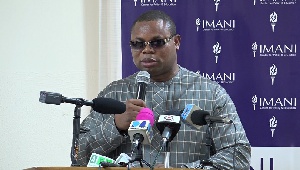While giving a presentation on legal ethics training, a program organized for law students in Accra, Supreme Court Justice William Atuguba reportedly made the following remarks:
“There is now great laxity in legal preparations on the part of counsel [lawyers] appearing before the courts, particularly the Supreme Court…Others just come one legal holiday; they just walk into the court and even forget what their briefs are about. You ask a simple question [and] they don’t know where it is.”
This sentiment about professional laxity and dereliction on the part of some Ghanaian lawyers is, indeed, symptomatic of the general decomposing flesh of our body politic—Ghana, although one has to also wonder when this viewpoint came to Atuguba’s holier-than-thou attention.
Perhaps Atuguba is a sanctimonious hypocrite, for we cannot bring ourselves to acknowledge the fact that what he is saying is a déjà vu or even an epiphany given his long tenure in the Ghanaian judiciary, his dealings with lawyers on a regular basis and as a former lawyer himself, and his close association with Dr. Raymond Atuguba, a Harvard-trained juridical science expert and a Senior Lecturer in Law at the Faculty of Law, University of Ghana.
And perhaps it is not déjà vu or epiphany after all, but the sheer weight of experience and of the practice of law.
Whatever the merit of these two schools of thought, it is clear that whiles what he, Atuguba, says maybe generally true of some particular lawyers, it also maybe generally equally true of some members in the esoteric clade of judgeship—of which he is a respected member.
What he may have made of Anas Aremeyaw Anas’ judicial corruption exposé is beyond our speculative horizon.
Plus, there is no need to provide an exhaustive rehash of the said Ana’s work here—it is already in the inventory of public knowledge.
But, we do find members of this clade of legal profession sporadically using such ignominiously outrageous phrases such as “learned friends” or “learned colleagues” to describe themselves, to cover up their professional derelictions and intellectual lapses as well as to put themselves in a unique if “superior” class of professional thinkers—the legal profession is as ordinary as any other profession.
What makes a judge or lawyer “learned” as opposed to the professional boxer, mathematician, a historian, a scientist, a musician, a linguist (“okyeame”), a newspaper editor, an author, a medical doctor, an astrophysicist, a griot, a polyglot, a trader, a tax collector, a sanitation officer, an armed robber, an actor/actress, soldier, homecare aid, a professional prostitute…?
What is more, the sheer ordinariness of the art of lawyering is exactly what demystifies it.
Yet, this cliché ordinariness belies the fact that it also harbors a caste of conmen and criminals and liars and swindlers who will move heaven and hell to make money at all cost—even at the expense of personal integrity, respect, ethos, honor, conscience and allegiance to ethical standards of this “noble” profession.
Italian-American Mario Puzo, late, author of the classic novels “The Godfather” and “The Sicilian,” had one of his characters saying the following words in the former work:
“A lawyer can steal more money with a briefcase than a thousand men with guns.”
This is not far from the truth.
It is not necessarily that the lawyer is a “genius” per se, but that he knows how to capitalize on his knowledge of the law and loopholes in the law, itself, to do the unthinkable—to criminalize his mind!
We can imagine the proverbial role of lawyers in organized crime, money laundering, and some of the major scandalous issues associated with offshore banking—not that we are implying every single instance of offshore banking is illegal or immoral in and of itself. It is a more complex subject matter than it seems on the surface.
We can clearly see that behind the average lawyer’s “lipstick” are charred lips behind which benevolent criminal minds lurk in hopes of cashing in on the vulnerability of those who are “ignorant” of the law.
That is not to say there are no “good” or “genuine” lawyers out there. Of course there are a few of such out there in Ghana.
Yet we are also called upon to interrogate our law schools and their associated professional organizations, what these law schools teach some of these lawyers, the educational and professional backgrounds of law professors/lecturers, and finally, what the Ghana Bar Association and the General Legal Council have done and are still doing about what Atuguba is lamenting about!
But with our lawyers and judges still happy wearing those anachronistic, neocolonial and disgusting horse-hair wigs, what should we exactly expect in terms of professional seriousness?
Reforms in the judiciary should begin with a total ban on the usage of these comical neocolonial cargo horse-hair wigs.
The hideous spaces in and under those horse-hair wigs are safe havens for bribery, incompetence, and corruption.
And here is what Kofi Abotsi, the Dean of the Faculty of Law at GIMPA, also had to say:
“Very often lawyers do not show up in court when they’ve been paid for it and clients end up in court without representation…‘conflict of interest’—that is one subject that very often lawyers don’t even see as a problem in Ghana.”
Again, this troubling observation is not only symptomatic of the men and women in the judiciary.
Ghanaians pay their politicians very well, but they and their interests lack strategic and tactical representation in the Flagstaff House and parliament.
Admittedly, conflict of interest is also one of the worst forms of political crimes in the nation.
In fact, conflict of interest is one major means through which individual politicians (and their political parties male illegal money) to finance their extravagant lifestyles, their political campaigns and those of the parties to which they belong.
And if members of the judiciary so not respect the Constitution and other national laws, why must others—parliamentarians, ordinary citizens, and politicians?
The farfetched implication that if lawyers “engage in pro bono, contribute to charity activities and hold politicians accountable” for the mere reason that such activities will somehow conscientize some individuals and also make them more politically and socially conscious—if not “better” lawyers—then we are all for it—but the criminal clade of jurists [as a group] will not go for it.
How can corrupt members of the judiciary hold politicians accountable? How can a poorly remunerated lawyer take up pro bono (and charitable causes) when he has mouths to feed?
The art of lawyering and lawyers assume the following forms:
Professors/lecturers who do not undertake research in their fields of expertise, publish their findings in respected peer-reviewed journals, or periodically review their class notes to reflect today’s methodological standards of intellectual rigor…professors/lecturers who assign female students false grades in exchange for sex…
WAEC officials who sell formal examination questions and answers to parents and students…
Judges who trade justice, equity, professional ethos, and fairness for sex, massage sessions, goats, tubers of yam and the freedoms of persons indicted and tried and found guilty—that is, of criminals including potential and real murderers, armed robbers…
Pastors, who rape their church members, sleep with married women, steal their churches’ money (tithes, offertory), make pretentious claims about their therianthropic prowess, lie…
Musicians who sample others’ works without proper attribution…
Politicians who steal from the national coffers and lie through their kleptomaniacal diastemata…
Parliamentarians who prefer the more exploitative Royalty Tax System to the more beneficial Production Sharing Agreement…
And guess what?
Let us impose a total ban on those anachronistic, neocolonial, comical horse-hair wigs and see what happens in the body politic as far as the law goes…Maybe our jurists can think better without them!
REFERENCE
Ghanaweb. “Justice Atuguba Questions Behavior Of Some Lawyers.” June 2, 2016.
Opinions of Friday, 3 June 2016
Columnist: Kwarteng, Francis














